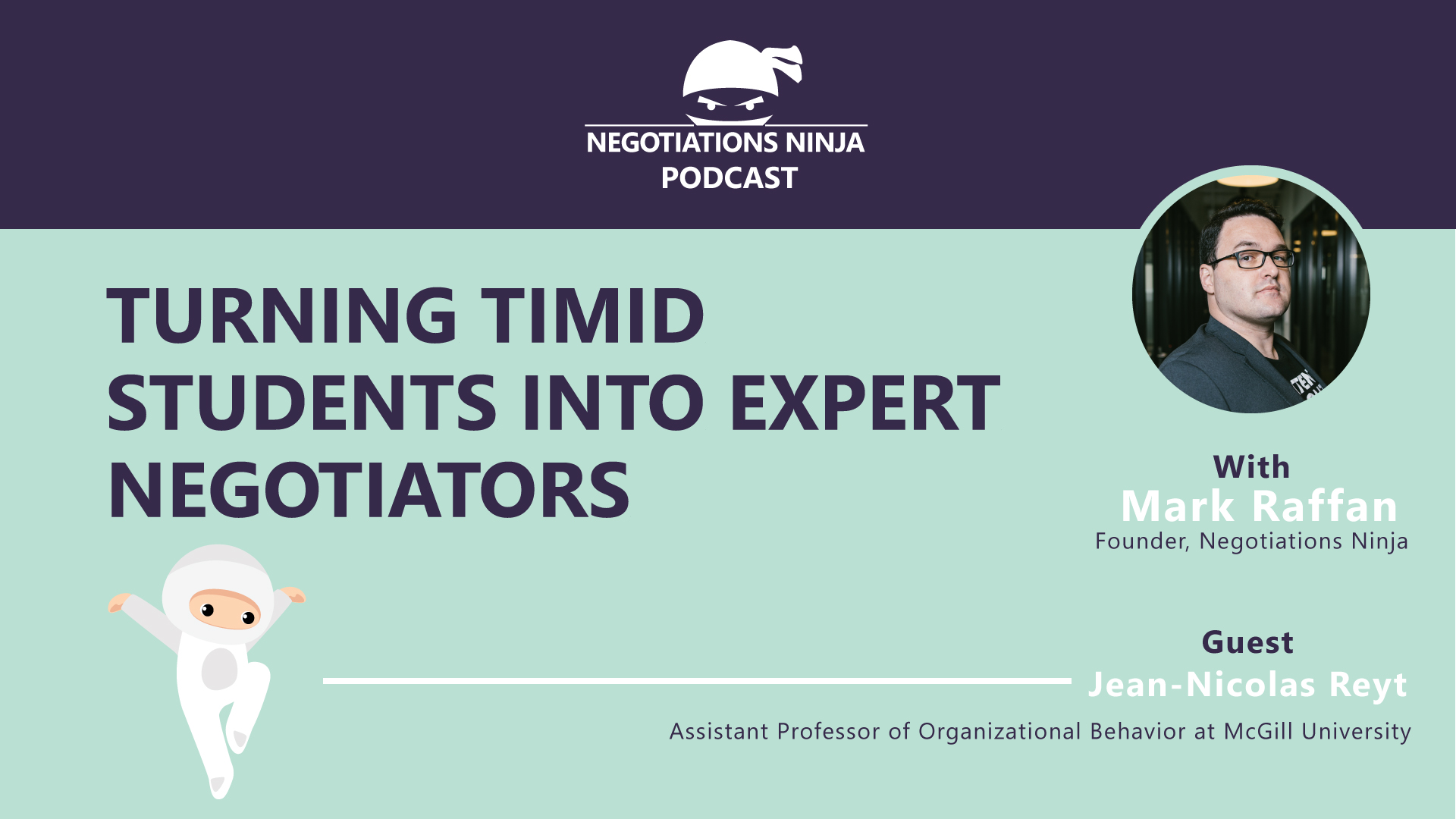In this episode of Negotiations Ninja, I chat with Jean-Nicolas Reyt—assistant professor of organizational behavior at McGill University—about the challenges students face when negotiating job offers when they leave universities. We also talk about why young people are hesitant to negotiate and what parents and educators can do to change that. Young people need to learn how to advocate for themselves to succeed in their future. This episode is full of spectacular advice—don’t miss it.
Outline of This Episode
- [1:30] Learn more about Jean Reyt
- [2:14] Why are young people hesitant to negotiate?
- [4:48] The transformation to assertiveness
- [7:28] Why don’t schools teach these critical life skills?
- [16:30] The end result of negotiating is always better
- [19:33] Why you must negotiate before you sign the contract
- [22:59] How to approach difficult conversations
- [27:25] How to connect with Jean-Nicolas Reyt
Why are young people hesitant to negotiate?
When Jean started teaching negotiation, he was convinced that his students would be sharks, that they’d be aggressive negotiators. In reality, they didn’t want to be sharks. They cared more about collaboration and win-win outcomes. They wanted to learn how to ask for things and make a case for them. Most of his students avoided negotiations. But they need to become more comfortable with it.
Jean thinks that younger people find it difficult to become assertive because they’ve been raised to be compliant. Young people are raised to do what they’re told by their parents and their teachers. Then they arrive at university and they’re told they need to be assertive and cooperative. But they don’t know how. So they become compliant, aggressive, or upset.
The transformation to assertiveness
Jean notes that something that works really well with students is running negotiation simulations. Then show them how they compare to everyone else. If you comply with everything you’re told, it’s easy to be okay with it because you don’t know what else you could’ve gotten. You probably feel like you just saved yourself from a difficult situation.
Jean uses an online platform called iDecisionGames where he can show everyone the score they got. You can see that some teams are better while others are completely dysfunctional and get a sub-par outcome. Once his students can see what their skills are giving them in a game the realization hits—what are their skills getting them in life?
Students have no way of denying that they’re missing out. They have to learn to take risks. The other party may get upset. You may not get what you want. But if you follow a specific method, then the risk is calculated. You can create a method that helps determine what you want, how to prepare, what persona you’ll take on, and more. Jean emphasizes that you are no longer taking risks when you’re prepared. You’re simply asking for something, listening to what the other party says, making a counterargument, and that’s it.
The end result of negotiating is always better
A few years ago, one of Jean’s students came to him to apologize in advance for being a terrible negotiator. Jean was surprised but told him that if he followed the method laid out for him in the class that he’d do just fine. By the end of the semester, this student has negotiated his first job—making a salary $15,000 higher than what he was initially offered. Jean remembers him being so excited. He changed the arc of his life. Now that he obtained one thing, he learned that he could obtain more great things by negotiating.
How to get students to approach difficult conversations
Jean created a contest that he runs every year in his undergrad and MBA classes, called “The Master Negotiators Contest.” He places students in teams of 3–4 who must compete to negotiate as many things outside of class as possible—and it must be for real money.
In Canada, you can negotiate your cell phone bill, your salary, insurance, and more. Last year, the students that participated created a surplus of $30,000, simply by negotiating. The goal is to create an incentive to show that people are making their lives better—why wouldn’t they do it?
Resources & People Mentioned
Connect with Jean-Nicolas Reyt
Connect With Mark
- Follow Negotiations Ninja on Twitter: @NegotiationPod
- Connect with Mark on LinkedIn
- Follow Negotiations Ninja on LinkedIn
- Connect on Instagram: @NegotiationPod
- negotiations.ninja




